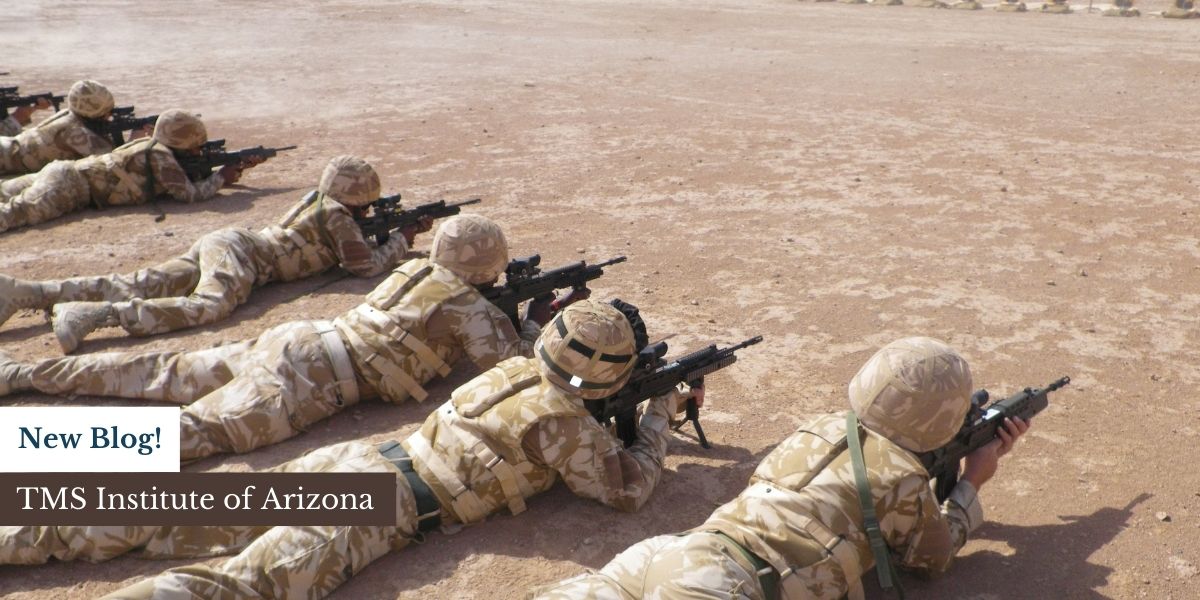
Posttraumatic Stress Disorder (PTSD) can be a tough challenge. Especially for veterans. It doesn’t just affect mental health but can also take a toll on physical well-being.
The impact of PTSD goes beyond the mind, touching every aspect of a person’s health, mainly in those diagnosed with Type 2 Diabetes (T2D). Veterans with PTSD have set of challenges that can worsen their diabetes. This can lead to poorer health outcomes.
What Does the Research Say About PTSD and Poor T2D Outcomes?
As we all know, Posttraumatic Stress Disorder (PTSD) and Type 2 Diabetes (T2D) are two challenging conditions. Especially when they co-occur. Meanwhile, a recent study titled “Posttraumatic Stress Disorder and Type 2 Diabetes Outcomes in Veterans” studies the relationship between these two conditions offering useful insights.
Overview of the Study
The study focused on a cohort of 10,002 veterans. These veterans, aged 18 to 80 were diagnosed with both PTSD and T2D. Data were collected from the US Veterans Health Administration (VHA) historical medical records.
It covers a period from October 2011 to September 2022. Their goal is to determine whether veterans whose PTSD symptoms improved ( no longer met the diagnostic criteria) had a lower risk of poor T2D outcomes compared to those with persistent PTSD.
Key Findings
Veterans who no longer met the criteria for PTSD showed improvements in some outcomes related to type 2 diabetes (T2D). Specifically:
- Microvascular Complications: Veterans who improved saw a slight reduction in the risk of developing microvascular complications. Even when other factors were considered.
- Insulin Therapy: Veterans (18 to 49 years old) who no longer had PTSD were much less likely to need insulin therapy.
- All-Cause Mortality: For younger veterans and those without depression, no longer meeting PTSD criteria was linked to a lower risk of dying from any cause.
The Implications
These findings suggest that PTSD may be a modifiable risk factor. When PTSD symptoms are effectively managed and reduced, veterans with comorbid T2D may experience better health outcomes. Primarily concerning microvascular complications, insulin dependency, and mortality risk.
Why It Matters
PTSD is often thought of as a mental health issue. But its more than that. This study shows how it also affects physical health, especially for veterans dealing with T2D. Reducing PTSD symptoms can actually improve diabetes outcomes. Which means we shouldn’t just focus on one thing at a time.
Taking care of both mental and physical health together can really boost overall well-being. So, it’s important to look at the whole picture when it comes to care. The mind and body are more connected than we might think.
What About the Limitations?
Of course, the study isn’t without limitations. It was conducted within the VHA system. Which means the findings may not be generalizable to non-VHA healthcare settings. Also, while the reduction in adverse outcomes is significant, its described as modest. So more research is needed to fully understand the extent of PTSD’s impact on T2D outcomes across different populations.
Takeaway
Mental health and physical health. They’re two sides of the same coin. For veterans with T2D, dealing with PTSD isn’t just about easing the mind. It’s also about keeping diabetes complications at bay. When veterans focus on treating PTSD, they’re not just boosting their mental well-being. They’re also giving their physical health a lift. It’s a win-win.
This approach doesn’t just lead to better mental health. It’s a holistic way to achieve overall well-being. Sure, more research is needed to see if these results hold up in different settings. But right now this study offers a bright spot. Tackling PTSD head-on can bring real, life-changing benefits to veterans living with T2D.
So, Why Are Veterans Particularly Vulnerable to These Co-occurring Conditions?
Veterans face unique challenges that can leave deep emotional scars. PTSD? It’s common among veterans. But why does it often go hand in hand with Type 2 Diabetes (T2D)?
- Chronic stress. Veterans with PTSD live in a constant state of alertness. Their bodies are always bracing for danger. This constant stress can mess with how the body regulates blood sugar. Over time, this disruption can pave the way for T2D.
- Lifestyle factors also is important. Veterans with PTSD might struggle with sleep, diet, and staying active. Poor sleep, unhealthy eating, and lack of exercise all contribute to T2D. For example, irregular meals or stress-eating can spike blood sugar, making diabetes harder to control.
- Then there’s the medication. Some meds for PTSD can cause weight gain. Weight gain is also big risk factor for T2D. Plus, certain PTSD treatments might mess with blood sugar control, complicating diabetes management even more.
- Social isolation doesn’t help either. Veterans with PTSD often pull back from social life. This isolation can lead to poor self-care, like neglecting diabetes management. Without a strong support system, managing T2D becomes even tougher.
- Access to healthcare is essential. While the Veterans Health Administration (VHA) does provide care, some veterans still face obstacles. Distance, long wait times, or even the stigma around seeking mental health care can keep veterans from getting the help they need. When PTSD is left untreated, managing diabetes becomes a steeper uphill battle.
What Are the Implications of Untreated PTSD on T2D Management?
Some implications of untreated PTSD on T2D management are:
- Uncontrolled Blood Sugar: When PTSD is left untreated, the stress and anxiety can create chaos in blood sugar control. Veterans may experience more frequent blood sugar spikes or drops. This instability makes managing T2D more challenging and increases the risk of complications.
- Increased Risk of Complications: Untreated PTSD doesn’t just affect mental health. It can also lead to severe physical health issues. Veterans with untreated PTSD are more likely to develop microvascular complications from T2D. These complications can include kidney disease, nerve damage and vision problems. And the risk of these complications rises when blood sugar levels are not well-controlled.
- Higher Mortality Rates: Perhaps most concerning is the link between untreated PTSD and higher mortality rates in veterans with T2D. The study discussed earlier underlines this risk. Veterans with untreated PTSD are at a higher risk of all-cause mortality. This stark statistic stresses the importance of addressing PTSD in veterans with T2D.
- Barriers to Self-Management: PTSD symptoms can create barriers to effective diabetes self-management. Veterans with PTSD may struggle with the routine and discipline required to manage T2D. For example, the memory issues or difficulty concentrating often linked to PTSD can complicate daily routines. This includes remembering to take medications, monitor blood sugar levels or even follow a healthy diet. These challenges can significantly impact overall health management
- Impact on Motivation: Motivation is another integral factor. Veterans with untreated PTSD may feel overwhelmed by their symptoms. Leading to a lack of motivation to manage their T2D. Depression. Which often accompanies PTSD can further diminish the drive to engage in necessary health behaviors.
What Steps Can Veterans Take to Manage Both PTSD and Type 2 Diabetes?
Managing both PTSD and Type 2 Diabetes (T2D) can feel overwhelming. But with the right strategies, veterans can take control of their health:
Prioritize Mental Health
First and foremost, prioritize mental health. PTSD can exacerbate T2D. So managing PTSD is necessary. Veterans should seek professional help. Therapy, counseling, or medications. Whatever works best for the individual.
TMS therapy, Cognitive Behavioral Therapy (CBT) and Eye Movement Desensitization and Reprocessing (EMDR) are effective therapies for PTSD. Managing mental health creates a solid foundation for managing physical health.
Establish a Routine
PTSD can throw daily life off balance, making it tough to maintain a regular schedule. However, a consistent routine can be a powerful tool for veterans dealing with both PTSD and T2D. Begin with simple manageable steps. Try setting regular times for meals, exercise, and sleep. This structure can help lower stress and keep blood sugar levels steady. Gradually, these small changes can lead to meaningful improvements in overall well-being.
Focus on Nutrition
Veterans with T2D need to be mindful of their diet. Balanced meals with controlled portions of carbohydrates can help manage blood sugar levels. Consider working with a dietitian to create a personalized meal plan.
And don’t forget, whats good for T2D is often good for mental health. Whole foods, lean proteins, and plenty of fruits and vegetables can boost mood and energy levels.
Stay Active
Physical activity is another key component. Exercise helps manage blood sugar levels and reduces PTSD symptoms. It doesn’t have to be intense. Even a daily walk can make a difference.
Aim for at least 30 minutes of moderate activity most days of the week. Find activities that are enjoyable. Whether it’s hiking, swimming, or yoga. Physical activity should be something to look forward to, not a chore.
Mindfulness and Relaxation
Managing stress is necessary for both PTSD and type 2 diabetes. Techniques like deep breathing, meditation and muscle relaxation can help lower stress levels and boost mental health. Mindfulness helps in making healthier decisions. It encourages staying present and prioritizing well-being. Focusing on these practices can make a significant difference in managing both conditions.
Monitor Health Regularly
Veterans should keep track of their blood sugar levels, PTSD symptoms, and overall well-being. Regular check-ups with healthcare providers assure that both conditions are being managed effectively. Adjustments to treatment plans may be necessary. So staying in touch with doctors is important.
Build a Support Network
Don’t go it alone. Building a strong support network is vital. This includes family, friends, healthcare providers, and support group. Having people to talk to and lean on makes managing PTSD and T2D more manageable. Support networks provide encouragement, accountability, and a sense of community.
Medication Management
Lastly, manage medications carefully. Veterans may be prescribed medications for both PTSD and T2D. It’s important to follow the prescribed regimen and communicate any side effects to healthcare providers. Some medications may interact. So regular consultations is a must.
Notice: This content is provided for informational purposes only and is not intended as medical advice. For individual health issues, consult a licensed healthcare provider.
TMS Institute of Arizona: Supporting Veterans with PTSD
TMS Institute of Arizona is helping veterans manage PTSD. While we focus on mental health, we recognize the interconnectedness of mental and physical well-being. Through Transcranial Magnetic Stimulation (TMS), we offer non-invasive treatment options that can help reduce PTSD symptoms.
Our partnership with TRICARE ensures that veterans and their families have access to affordable and high-quality care. Message us.
References:
Scherrer, J. F., Salas, J., Wang, W., Freedland, K. E., Lustman, P. J., Schnurr, P. P., Cohen, B. E., Jaffe, A. S., & Friedman, M. J. (2024). Posttraumatic Stress Disorder and Type 2 Diabetes Outcomes in Veterans. JAMA Network Open, 7(8), e2427569–e2427569. https://doi.org/10.1001/jamanetworkopen.2024.27569













